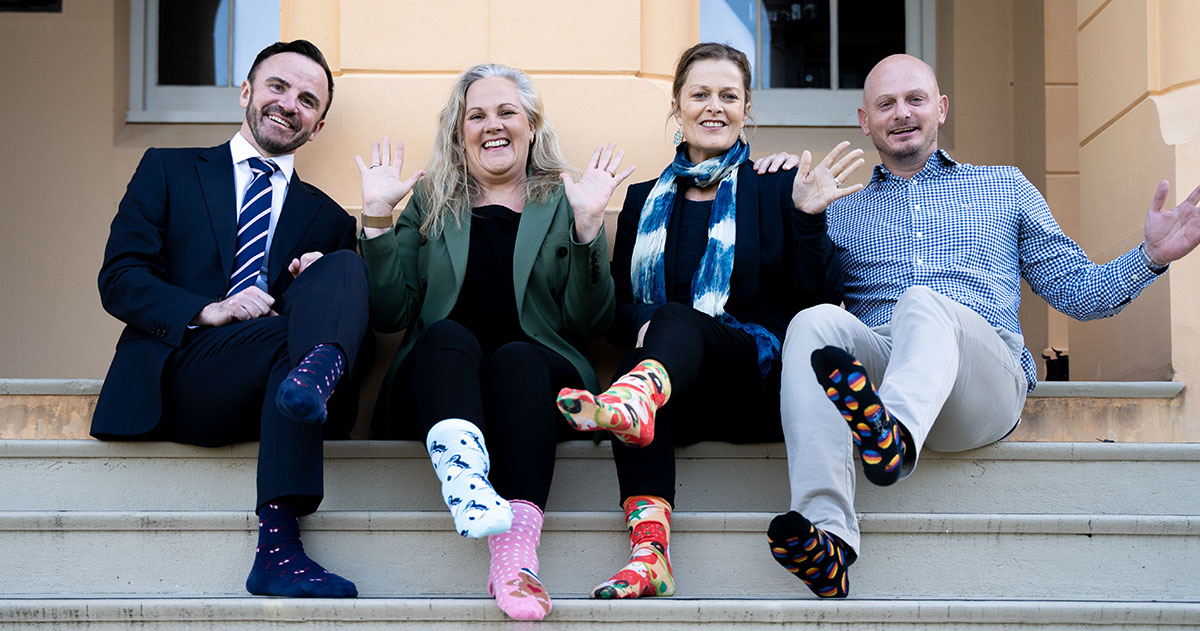Held on the first Friday of June, Crazy Socks 4 Docs day aims to break down the stigma around mental health in doctors by making it okay not to be okay.
Doctors and medical students are renowned for putting others first, which can put their own mental health at risk. Maybe you’ve noticed that a peer or colleague is not behaving as they normally would, or you get the feeling that they are just not themselves. Although it can seem awkward or daunting to start a conversation, trusting your gut that something isn’t right can make a huge difference.
To spread awareness this Crazy Socks 4 Docs day, we reached out to Jacinta Sinclair, from the Medical Student Support team, who provided some helpful advice about starting those difficult conversations and looking after yourself.

Starting a conversation
- Start by gently bringing up the changes you’ve noticed in the person and let them know you care about their wellbeing. This can help the person to feel safe to have a conversation about what’s going on for them if they are not ok. We know that every student who has been supported by their peers and friends is very appreciative of these conversations. Nothing is too big or too small that you cannot talk about it.
- Listen with an open mind. Take what they say seriously and don’t rush the conversation and encourage them to explain ‘how does this make you feel?’ or ‘how long have you been experiencing this struggle?’
- Encourage action. Ask them how you could offer support or talk about past situations that might have helped manage similar scenarios. Remember that some conversations are too big for friends and family to take on alone, so you could encourage them to seek the health of a professional.
- Check in. Make a reminder for yourself to check in and follow up to see how they are doing. Genuine care and concern can make a real difference.
Taking care of yourself
Self-care is also important, and a good starting place is looking at the Healthy Mind Platter. However, there are a couple of other things that you can do to care for yourself:
- Get to know your signs of stress: This is different for everyone, but with moments of regular reflection you will start to notice your indicators. Some common signs of stress include disturbed sleep, problems with memory or recall, difficulty concentrating, withdrawing from others, headaches, or an upset stomach.
- Take regular breaks: Set up calendar reminders, an alarm on your phone, or even a kitchen timer to remind you to get up, stretch or drink a glass of water. An outdoor break is even better – walk around the block or the Great Court to recharge your mind and body.
- Build good relationships: Invest time in relationships that are positive and supportive. This might be with classmates, family, and friends from home or even acquaintances in other areas of your life. Make a point each day of initiating a conversation with someone.
- Find a GP: Keeping well physically and mentally are equally important, and one often informs the other. If you need assistance finding a GP check out the student resources on the Queensland Doctors’ Health Programme site, chat with the Medical Student Support Team, or visit the UQ Health Service.
- Breathe: Take 20 seconds to focus on your breathing and your body will automatically start to breathe more deeply. A good technique to try is to inhale for a count of four, hold for four, then exhale for a count of four — all through the nose, which adds a natural resistance to the breath. With time and practice, you can increase this to six to eight counts per breath.
- Get into a good sleep routine: Go to bed and get up at the same time each day, avoid caffeine and alcohol before bed, and create a space conducive to sleep, free from distractions.
As always, the Medical Student Support Team is here to help. Feel free to contact the team at med.mss@uq.edu.au. No one should walk alone with a mental health issue.
Student Services has support available, including individual counselling services that are free and confidential. UQ after-hours crisis line operates 24/7. Call 1300 851 998.
